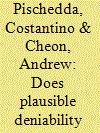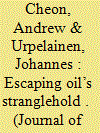| Srl | Item |
| 1 |
ID:
180670


|
|
|
|
|
| Summary/Abstract |
When do indigenous and other negatively affected populations mobilize against fossil fuel companies? We revisit social movement theory and environmental literature to identify three factors that may plausibly shape mobilization decisions of negatively affected populations—democratic institutions, community perceptions of government shaped by land tenure security, and firm attributes. Democratic institutions afford more opportunities for affected populations to air their grievances through protests than non-democratic ones. Land tenure security guaranteed by government contributes to the perception among affected populations that their objectives are better achieved through government mediation than protests. Characteristics of fossil fuel firms, such as state ownership, also shape activist perceptions of government credibility as a mediator. By analyzing fifty-seven countries over the period 1990 to 2013, we find that democracy and state ownership of fossil fuel firms are positively associated with protests, whereas land tenure security is negatively associated.
|
|
|
|
|
|
|
|
|
|
|
|
|
|
|
|
| 2 |
ID:
192519


|
|
|
|
|
| Summary/Abstract |
States conduct unclaimed coercive acts, imposing costs on adversaries to signal resolve but denying (or not claiming) responsibility. Some scholars posit that unclaimed acts have considerable potential to coerce targets, while containing escalation risks. Others suggest that unclaimed coercive efforts tend to fail and trigger escalation. We assess these competing perspectives about the effects of unclaimed attacks with a vignette experiment exposing US-based respondents to a scenario where, after Russia warns of unpredictable consequences if NATO continues providing weapons to Ukraine, an explosion occurs at a NATO base in Poland used to funnel weapons to Ukraine. Intelligence agencies and independent analysts identify Russia as the likely culprit, while not ruling out the possibility of an accident. We randomize whether Russia claimed or denied responsibility for the explosion and find that unclaimed acts have lower coercive leverage than claimed ones, but the two do not significantly differ in escalation risk.
|
|
|
|
|
|
|
|
|
|
|
|
|
|
|
|
| 3 |
ID:
141187


|
|
|
|
|
| Summary/Abstract |
Modern economies and militaries are fundamentally dependent on oil, but the study of energy security has fallen out of favor in the field of international relations. We develop and test a theory of when and how states invest in energy security. We argue that states implement policies to improve their energy security when they perceive a risk of a militarized dispute and international oil markets are dominated by a small number of Middle Eastern producers. Empirically, we show that industrialized countries with reasons to worry about their security have significantly increased their public investment in energy research and development in response to an increase in the Middle East’s share of the world oil supply.
|
|
|
|
|
|
|
|
|
|
|
|
|
|
|
|
| 4 |
ID:
121294


|
|
|
|
|
| Publication |
2013.
|
| Summary/Abstract |
Governments spend hundreds of billions of dollars annually to subsidize the consumption of fossil fuels without understanding the environmental and economic problems this practice creates. To shed light on these problems, we examine the case of gasoline subsidies using data on gasoline prices in 137 countries for the years 2002-2009. It is useful to study gasoline pricing because gasoline is the most important transportation fuel, and there are data for many countries for the time period of investigation. We find that major oil producers subsidize gasoline consumption by artificially reducing prices; countries with weak institutional capacity also seem to subsidize gasoline, but the effects are weaker. These results suggest that policy interventions to improve institutional capacity could help developing countries in particular reduce their fossil fuel subsidies.
|
|
|
|
|
|
|
|
|
|
|
|
|
|
|
|